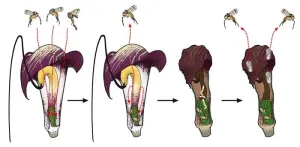(Press-News.org) To prevent an emerging genomic technology from contributing to health disparities, a scientific team funded by the National Institutes of Health has devised new ways to improve a genetic testing method called a polygenic risk score. Since polygenic risk scores have not been effective for all populations, the researchers recalibrated these genetic tests using ancestrally diverse genomic data. As reported in Nature Medicine, the optimized tests provide a more accurate assessment of disease risk across diverse populations.
Genetic tests look at the small differences between individuals’ genomes, known as genomic variants, and polygenic risk scores are tools for assessing many genomic variants across the genome to determine a person’s risk for disease. As the use of polygenic risk scores grows, one major concern is that the genomic datasets used to calculate the scores often heavily overrepresent people of European ancestry.
“Recently, more and more studies incorporate multi-ancestry genomic data into the development of polygenic risk scores,” said Niall Lennon, Ph.D., a scientist at the Broad Institute in Cambridge, Massachusetts and first author of the publication. “However, there are still gaps in genetic ancestral representation in many scores that have been developed to date.”
These “gaps” or missing data can cause false results, where a person could be at high risk for a disease but not receive a high-risk score because their genomic variants are not represented. Although health disparities often stem from systemic discrimination, not genetics, these false results are a way that inequitable genetic tools can exacerbate existing health disparities.
In the new study, the researchers improved existing polygenic risk scores using health records and ancestrally diverse genomic data from the All of Us Research Program, an NIH-funded initiative to collect health data from over a million people from diverse backgrounds.
The All of Us dataset represented about three times as many individuals of non-European ancestry compared to other major datasets previously used for calculating polygenic risk scores. It also included eight times as many individuals with ancestry spanning two or more global populations. Strong representation of these individuals is key as they are more likely than other groups to receive misleading results from polygenic risk scores.
The researchers selected polygenic risk scores for 10 common health conditions, including breast cancer, prostate cancer, chronic kidney disease, coronary heart disease, asthma and diabetes. Polygenic risk scores are particularly useful for assessing risk for conditions that result from a combination of several genetic factors, as is the case for the 10 conditions selected. Many of these health conditions are also associated with health disparities.
The researchers assembled ancestrally diverse cohorts from the All of Us data, including individuals with and without each disease. The genomic variants represented in these cohorts allowed the researchers to recalibrate the polygenic risk scores for individuals of non-European ancestry.
With the optimized scores, the researchers analyzed disease risk for an ancestrally diverse group of 2,500 individuals. About 1 in 5 participants were found to be at high risk for at least one of the 10 diseases.
Most importantly, these participants ranged widely in their ancestral backgrounds, showing that the recalibrated polygenic risk scores are not skewed towards people of European ancestry and are effective for all populations.
“Our model strongly increases the likelihood that a person in the high-risk end of the distribution should receive a high-risk result regardless of their genetic ancestry,” said Dr. Lennon. “The diversity of the All of Us dataset was critical for our ability to do this.”
However, these optimized scores cannot address health disparities alone. “Polygenic risk score results are only useful to patients who can take action to prevent disease or catch it early, and people with less access to healthcare will also struggle to get the recommended follow-up activities, such as more frequent screenings,” said Dr. Lennon.
Still, this work is an important step towards routine use of polygenic risk scores in the clinic to benefit all people. The 2,500 participants in this study represent just an initial look at the improved polygenic risk scores. NIH’s Electronic Medical Health Records and Genomics (eMERGE) Network will continue this research by enrolling a total of 25,000 participants from ancestrally diverse populations in the study’s next phase.
END
Researchers optimize genetic tests for diverse populations to tackle health disparities
Improved genetic tests more accurately assess disease risk regardless of genetic ancestry.
2024-02-19
ELSE PRESS RELEASES FROM THIS DATE:
Cleveland Clinic-led study discovers link between high levels of niacin - a common b vitamin - and heart disease
2024-02-19
February 19, 2024, Cleveland: Cleveland Clinic researchers have identified a new pathway that contributes to cardiovascular disease associated with high levels of niacin, a common B vitamin previously recommended to lower cholesterol.
The team, led by Stanley Hazen, M.D., Ph.D., discovered a link between 4PY, a breakdown product from excess niacin, and heart disease. Higher circulating levels of 4PY were strongly associated with development of heart attack, stroke and other adverse cardiac events in large-scale clinical studies. The researchers also showed in preclinical studies that 4PY directly triggers vascular ...
Neighborhood segregation and access to live donor kidney transplantation
2024-02-19
About The Study: Segregated residential and transplant center neighborhoods likely serve as a mechanism of structural racism, contributing to persistent racial disparities in access to live donor kidney transplantation. To promote equitable access, studies should assess targeted interventions (e.g., community outreach clinics) to improve support for potential candidates and donors and ultimately mitigate the effects of segregation.
Authors: Mara A. McAdams-DeMarco, Ph.D., of the New York University Grossman School of Medicine in New York, is the corresponding author.
To access the embargoed study: Visit our For The Media website at this link ...
Age-related risk of serious fall events and opioid analgesic use
2024-02-19
About The Study: The results of this study of 3.2 million people who initiated prescription opioid treatment suggest that prescription opioids were associated with increased risk of serious fall events among adults of all ages, with individuals 85 years or older at greatest risk. These risks should be considered when prescribing opioids, particularly for individuals with preexisting risk factors or when opioids are prescribed at higher doses. Targeted falls prevention efforts may be most effective within the first month following opioid initiation.
Authors: Natasa Gisev, Ph.D., of the National Drug and Alcohol Research Centre, UNSW ...
Genetic risk prediction for 10 chronic diseases moves closer to the clinic
2024-02-19
By analyzing millions of small genetic differences across a person’s genome, researchers can calculate a polygenic risk score to estimate someone’s lifetime odds of developing a certain disease. Over the past decade, scientists have developed these risk scores for dozens of diseases, including heart disease, kidney disease, diabetes, and cancer, with the hope that patients could one day use this information to lower any heightened risk of disease. But determining whether such tests work effectively across all populations, and how they can guide clinical decision-making, has been a challenge.
Now, ...
Newly discovered genetic markers help pinpoint diabetes risks, complications
2024-02-19
In the largest genome-wide association study to date on Type 2 diabetes, a team of international researchers, co-led by a University of Massachusetts Amherst genetic epidemiologist, has located 1,289 genetic markers associated with Type 2 diabetes (145 of which are newly identified) and generated risk scores for diabetes complications.
In research published Monday, Feb. 19 in the journal Nature that advances understanding into the inheritability of Type 2 diabetes, the scientists used cutting-edge ...
One step forward, no steps back: new study advances understanding of dopamine’s role in movement
2024-02-19
Dopamine, a chemical messenger in the brain, is mostly known for its role in how we experience pleasure and reward. However, new research from the Champalimaud Foundation (CF) shifts the spotlight towards dopamine’s critical involvement in movement, with implications for our understanding and treatment of symptoms in Parkinson’s Disease (PD).
Imagine the act of walking. It’s something most able-bodied people do without a second thought. Yet it is actually a complex process involving various ...
Pollinator's death trap turns into nursery
2024-02-19
In a group of plants that is famous for luring its pollinators into a death trap, one species offers its flowers as a nursery in exchange. The Kobe University discovery blurs the line between mutualism and parasitism and sheds light on the evolution of complex plant-insect interactions.
Many plants rely on animals for pollination and most offer rewards for the service. Some plants, however, deceive their pollinators, and a famous example is the genus Arisaema. “It is famous as the only plant that achieves pollination at the expense of the pollinator's life,” says Kobe University biologist SUETSUGU Kenji, who is an expert on plant pollination ecology. The plant uses ...
Studies find flu vaccines were effective in 2022-2023 flu season
2024-02-19
The prospect of the worrisome triple threat of COVID, RSV and flu was assuaged last year by the effectiveness of flu vaccines. Two recent studies from the Centers for Disease Control and Prevention’s VISION Network have found that flu vaccines were effective for all ages against both moderate and severe flu in the U.S. during the 2022-2023 flu season.
Both the pediatric and adult VISION Network studies analyzed flu-associated emergency department (E.D.)/urgent care visits (indicative of moderate disease) and hospitalization (indicative of severe disease) from October 2022 through March 2023, a flu season in which far fewer individuals were social distancing or ...
Second year of Cal Poly astronomy fellowship to examine high-energy particle jets near supermassive black holes
2024-02-19
February 16, 2024
Contact: Nick Wilson
805-235-8008; nwilso28@calpoly.edu
Second Year of Cal Poly Astronomy Fellowship to Examine High-Energy Particle Jets Near Supermassive Black Holes
SAN LUIS OBISPO — In the second year of the Astronomy Faculty Research Fellowship in Cal Poly’s Bailey College of Science and Mathematics, a research team will study extremely high-energy photons emitted by the extreme environment found near mega-sized black holes.
The fellowship was ...
To boost a preschooler’s language skills, consider reminiscing
2024-02-19
Language skills are strong predictors of academic, socioemotional and behavioral outcomes when children enter school. They learn language in preschool years by interacting with others, especially their parents. Book sharing is a popular way parents engage young children in conversation. However, not all parents are comfortable with book sharing and not all children like having books read to them.
A new study on “parent talk” by Florida Atlantic University, in collaboration with Aarhus University in Denmark, provides ...
LAST 30 PRESS RELEASES:
Public and patient involvement in research is a balancing act of power
Scientists discover “bacterial constipation,” a new disease caused by gut-drying bacteria
DGIST identifies “magic blueprint” for converting carbon dioxide into resources through atom-level catalyst design
COVID-19 vaccination during pregnancy may help prevent preeclampsia
Menopausal hormone therapy not linked to increased risk of death
Chronic shortage of family doctors in England, reveals BMJ analysis
Booster jabs reduce the risks of COVID-19 deaths, study finds
Screening increases survival rate for stage IV breast cancer by 60%
ACC announces inaugural fellow for the Thad and Gerry Waites Rural Cardiovascular Research Fellowship
University of Oklahoma researchers develop durable hybrid materials for faster radiation detection
Medicaid disenrollment spikes at age 19, study finds
Turning agricultural waste into advanced materials: Review highlights how torrefaction could power a sustainable carbon future
New study warns emerging pollutants in livestock and aquaculture waste may threaten ecosystems and public health
Integrated rice–aquatic farming systems may hold the key to smarter nitrogen use and lower agricultural emissions
Hope for global banana farming in genetic discovery
Mirror image pheromones help beetles swipe right
Prenatal lead exposure related to worse cognitive function in adults
Research alert: Understanding substance use across the full spectrum of sexual identity
Pekingese, Shih Tzu and Staffordshire Bull Terrier among twelve dog breeds at risk of serious breathing condition
Selected dog breeds with most breathing trouble identified in new study
Interplay of class and gender may influence social judgments differently between cultures
Pollen counts can be predicted by machine learning models using meteorological data with more than 80% accuracy even a week ahead, for both grass and birch tree pollen, which could be key in effective
Rewriting our understanding of early hominin dispersal to Eurasia
Rising simultaneous wildfire risk compromises international firefighting efforts
Honey bee "dance floors" can be accurately located with a new method, mapping where in the hive forager bees perform waggle dances to signal the location of pollen and nectar for their nestmates
Exercise and nutritional drinks can reduce the need for care in dementia
Michelson Medical Research Foundation awards $750,000 to rising immunology leaders
SfN announces Early Career Policy Ambassadors Class of 2026
Spiritual practices strongly associated with reduced risk for hazardous alcohol and drug use
Novel vaccine protects against C. diff disease and recurrence
[Press-News.org] Researchers optimize genetic tests for diverse populations to tackle health disparitiesImproved genetic tests more accurately assess disease risk regardless of genetic ancestry.





